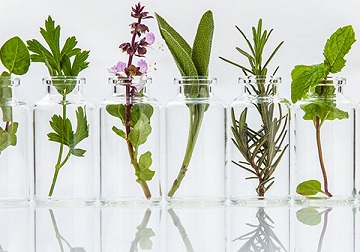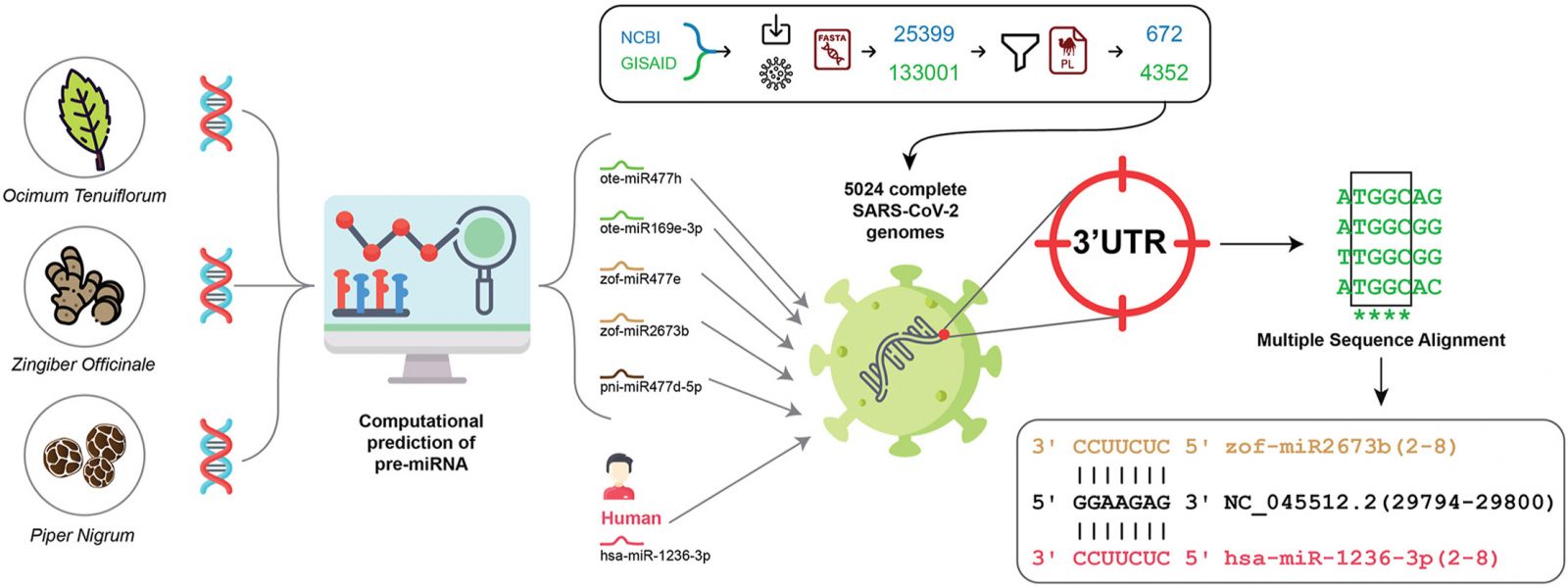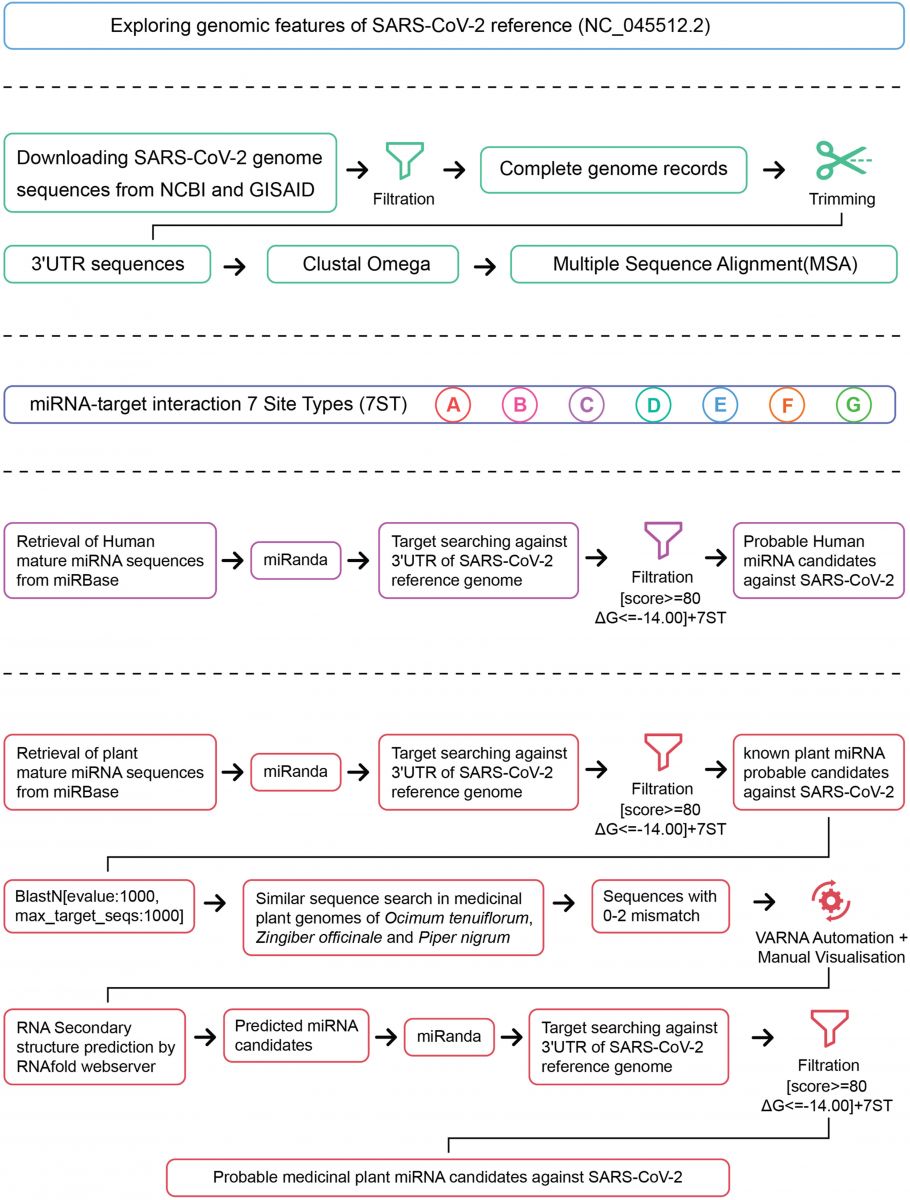COVID-19 Therapeutics: MicroRNAs From Plants And Even Humans Might be The Holy Grail To Stopping The SARS-CoV-2 Crisis
Source: miRNAs and SARS-CoV-2 Aug 02, 2021 4 years, 4 months, 3 weeks, 5 days, 6 hours, 31 minutes ago
COVID-19 Therapeutics: Researchers from Gujarat University inspired by Thailand Medical News call to focus on Phytochemicals and microRNAs as solutions to containing the SARS-CoV-2 pandemic have in a new study utilizing computational workflow, identified potential cellular miRNA candidates that are potent in providing antiviral defense against SARS-CoV-2 infection.

The study team designed a systematic computational workflow to identify the cellular
microRNAs (miRNAs) from human host possessing the capability to target and silence 3′UTR of SARS-CoV-2 genome.
The team next further extended their miRNA search to medicinal plants like Ocimum tenuiflorum, Zingiber officinale and Piper nigrum, which are well-known to possess antiviral properties, and are often consumed raw or as herbal decoctions.
Such an approach, that makes use of miRNA of one species to interact and silence genes of another species including viruses is broadly categorized as cross-kingdom interactions. As a part of the team’s genomics study on host-virus-plant interaction, the study team identified one unique 3′UTR conserved site ‘GGAAGAG’ amongst 5024 globally submitted SARS-CoV-2 complete genomes, which can be targeted by the human miRNA ‘hsa-miR-1236–3p’ and by
Z. officinale miRNA ‘zof-miR2673b’.
The study team also predicted that the members of miR477 family commonly found in these three plant genomes possess an inherent potential to silence viral genome RNA and facilitate antiviral defense against SARS-CoV-2 infection.
Significantly the study findings reveal a universal site in the SARS-CoV-2 genome that may be crucial for targeted therapeutics to cure COVID-19.
The study findings were published in the peer reviewed journal: Computers in Biology and Medicine (Science Direct ) by Elsevier.
https://www.sciencedirect.com/science/article/pii/S001048252100456X

Thailand Medical News would like to add that after auditing the systematic approach adopted by the researchers from the University of Gujerat, the nutraceutical cum biotech firm BioInnovations-US and the genomic based diagnostics company: Advait Theragnostics-India, it was concluded the studies were meticulously and professionally executed according to global acceptance standards.
 Systematic workflow of the study
Systematic workflow of the study
Thailand Medical News (TMN) has been advocating the usage of
plant miRNAs in combination with other phytochemicals as an effective therapeu
ctic agent against the SARS-Cov-2 coronavirus.
TMN had worked with Chinese researchers in identifying plant miRNAs from a certain cultivar of honeysuckle that are able to inhibit the SARS-CoV-3 coronavirus.
https://www.thailandmedical.news/news/breaking-news-covid-19-herbs-researchers-confirms-that-in-studies-and-clinical-trials-the-herb-honeysuckle-has-efficacy-against-sars-cov-2
TMN has incorporated miRNAs from honeysuckle and also other plants in our special therapeutic teas that have been shown to possess both prophylactic and also therapeutic properties against the SARS-CoV-2 coronavirus and the COVID-19 disease.
https://www.thailandmedical.news/news/new-therapeutic-teas-
While some are advocating the usage of single herbs as a possible therapeutic against the COVID-1 disease such as Andrographis Panniculata or Artemisia Annua and others are simply focusing on just extracted phytochemicals, such approaches are deemed to be futile as the SARS-CoV-2 is able to not only mutate rapidly to develop resistance to single and even combo agents but it is able to also rearrange its viral proteins on the various ORF and N regions of its genome to evade various effects from such agents.
Please help to support this website and also all our research initiatives and community projects by making a donation. https://www.thailandmedical.news/p/sponsorship
Your donation directly and indirectly helps saves lives. Please do not just read and ignore our pleas for help. Thank You.
Only a multi-pronged approached of using a variety of plant miRNAs along with various phytochemicals in the right bioactive and easily absorbable forms will be a much effective method of developing an effective therapeutic agent against the SARS-CoV-2 coronavirus.
At present the world is at a critical juncture with regards to the COVID-19 pandemic. Even after the development of effective vaccines and the commencement of global vaccination campaigns, health officials continue to report a high percentage of people who are reluctant to be vaccinated.
In addition, the continuous emergence of SARS-CoV-2 variants has challenged the effectiveness of approved vaccines.
There is a dire need therefore to develop alternative approaches that could directly target SARS-CoV-2 particles. One potential approach that could be used to combat SARS-CoV-2 infection is to target the viral genome’s functional integrity using microRNAs (miRNAs).
The SARS-CoV-2 coronavirus is a single-stranded positive-sense ribonucleic acid (RNA) virus belonging to the family Coronaviridae. This virus is approximately 26–32 kilobases (kb) in size and consists of 14 open reading frames (ORFs) that encode for 27 polyproteins.
The novel coronavirus encodes 16 non-structural proteins (nsps), accessory proteins, and structural proteins. The structural proteins of SARS-CoV-2 include the spike (S), envelope (E), membrane (M), and nucleocapsid (N) proteins.
These viral proteins have been the primary targets for vaccine development, as well as drug repurposing and therapeutics studies.
Interestingly the SARS-CoV-2 genome also consists of two flanking untranslated regions (UTRs) at the 5′ end of 265 nucleotides and 3′ end of 358 nucleotides.
Typically, viruses take over the control of host cellular machinery, such as nucleic acid synthesis and protein translation system, in order to advance their replication within the host.
The study team from Gujerat believes that if the functionality of the virus is silenced, the proteins that aid in the viral replication of the host cells will not be synthesized. Therefore, such gene silencing of the virus would lead to apoptosis of the infected cell.
Typically the miRNA is a non-immunogenic and single-stranded noncoding RNA that is about 22 nucleotides in size and is an important part of the eukaryotic cell.
MicroRNA or miRNAs that are endogenously found in humans are known as ‘cellular miRNAs,’ whereas those which are acquired by ingesting vegetables are known as ‘plant miRNAs.’
These miRNAs play a vital role in regulating the expression of various genes at the post-transcriptional phase.
Numerous studies have shown that the main role of plant-derived miRNA is the repression or inhibition of gene expression. For example, a plant-derived miRNA known as ‘miRNA2911’ has been found to suppress the expression of the influenza A virus in mice.
https://www.nature.com/articles/cr2014130
Importantly in the context of inhibiting the SARS-CoV-2 gene, the study team found that the miRNA, present both endogenously inside the host or acquired exogenously through diet, could bind with the 3′ UTR flanking region of the virus via complementary binding. This interaction can repress protein translation or promote messenger RNA (mRNA) degradation to block protein translation.
A study last year has revealed that administering honeysuckle decoction, which consists of plant miRNA2911, could efficiently absorb and inhibit SARS-CoV-2 viral replication. This approach has shown that the miRNA of one species can interact and silence genes of another species, including viruses, via cross-kingdom interactions.
https://www.thailandmedical.news/news/breaking-news-covid-19-herbs-researchers-confirms-that-in-studies-and-clinical-trials-the-herb-honeysuckle-has-efficacy-against-sars-cov-2
This new study by the researchers from Gujerat focuses on the identification of probable miRNA candidates from three medicinal plants; namely, Ocimum tenuiflorum, Zingiber officinale, and Piper nigrum, that are associated with cross-species interaction. Each of these plants is known to possess antiviral properties and can be consumed raw or as an herbal decoction.
The study team designed a systematic computational workflow to identify probable cellular miRNA candidates that are potent in providing antiviral defense against SARS-CoV-2 infection.
The team studied host-virus-plant interaction and have successfully identified one unique 3′UTR conserved site of ‘GGAAGAG’ among 5,024 globally submitted complete sequences of SARS-CoV-2.
This conserved site can be targeted by both endogenous human miRNA (hsa-miR-1236–3p) and exogenous Z. officinale miRNA (zof-miR2673b).
Also three prospective anti-SARS-CoV-2 miRNAs were identified and found to belong to the miR477 family.
Often the members of the miR477 family have the inherent ability to silence viral genome RNA and promote antiviral activity. These results, therefore, highlight that the usage of these three plants in the right form could be effective in the prevention or management of COVID-19.
The study findings concludes that targeting the SARS-CoV-2’s 3′ UTR region with miRNA could trigger a silencing mechanism that can ultimately cause transcriptional repression. The study used the principle of cross-kingdom interaction, where plants were used as a potential source of exogenous miRNAs that could efficiently repress viral replication in the host.
Importantly the study team identified one conserved 3′UTR site in SARS-CoV-2 genomes that can be targeted by human miRNA (hsa-miR-1236–3p) and Z. officinale miRNA (zof-miR2673b).
Significantly, this conserved site in the SARS-CoV-2 genome that could be effectively used as an alternative target to combat COVID-19.
Please help to support this website and also all our research initiatives and community projects by making a donation. https://www.thailandmedical.news/p/sponsorship
Your donation directly and indirectly helps saves lives. Please do not just read and ignore our pleas for help. Thank You.
For more about
miRNAs and SARS-CoV-2, keep on logging to Thailand Medical News.


